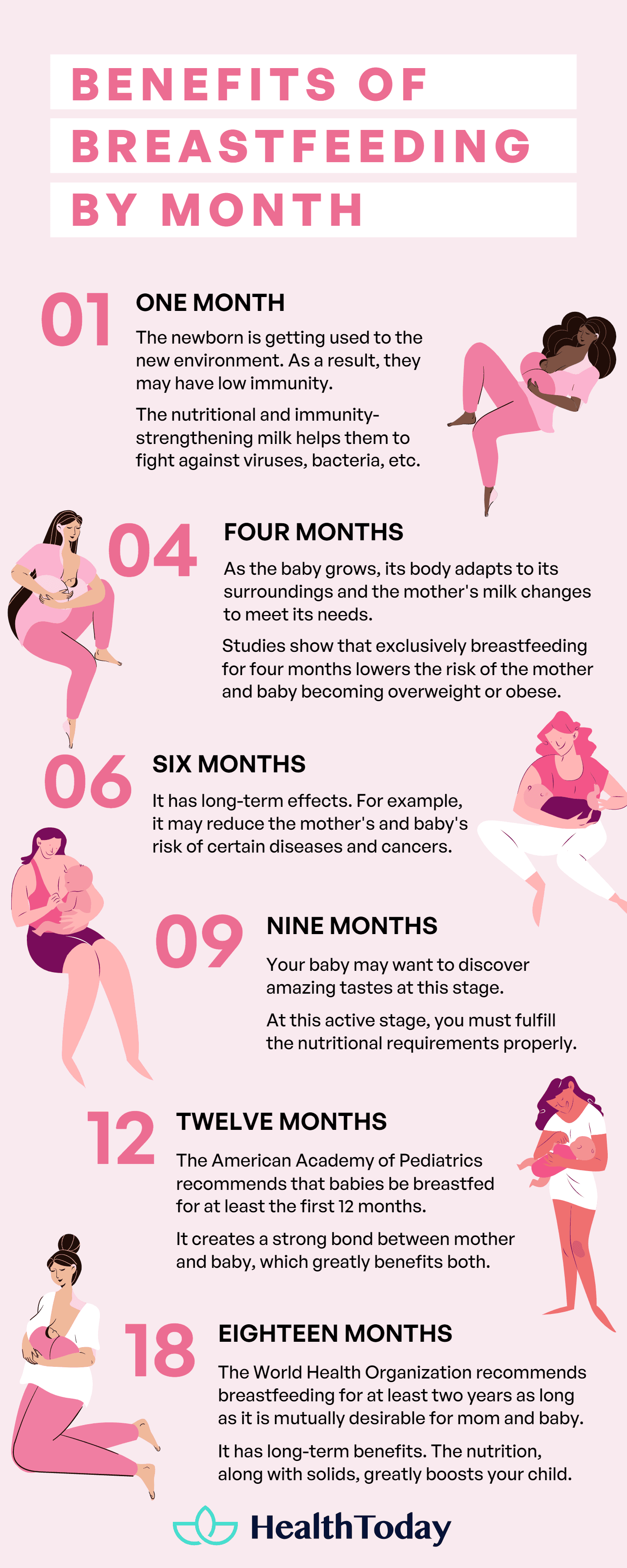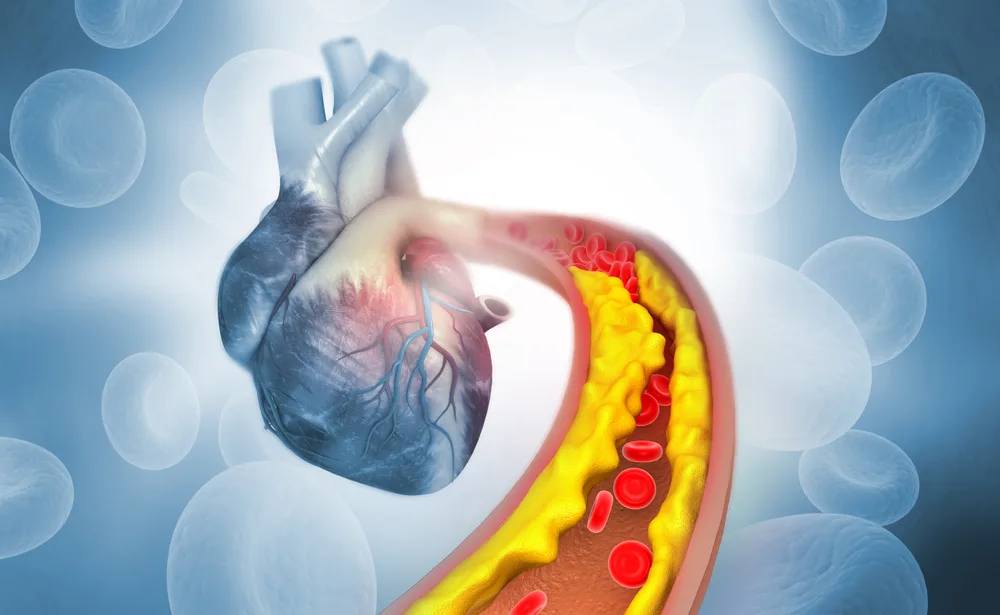Table of Contents
Breastfeeding is nature’s most beautiful way of providing optimal nutrition to the newborn. Interestingly, it is helpful for the mothers also as it boosts bonding and keeps the stress away. Also, it aids in the overall development of the baby.
Breast milk is gentle, nourishing, and very essential. If you are breastfeeding or an expecting mother, here are all the breastfeeding benefits for your baby and you and other important information.
Benefits of breast milk
To understand the benefits of breastmilk, you should be aware of its composition. There are stages in the formation of breast milk:
Colostrum
Colostrum is thick, sticky, and breast milk (1). Its primary function is immunologic and trophic milk, which helps babies in many ways (2).
Moreover, the expecting mothers may notice colostrum leaking in the last weeks of pregnancy due to the action of hormones (1). It is the baby’s first food, which lasts for a few days after labor.
It is high in protein, fat-soluble vitamins, minerals, and immunoglobulins (3). The immunoglobulin type of antibodies helps babies to develop passive immunity and protect vulnerable infants (3).
Transitional milk
After a few days of labor, your breast milk may change to transitional milk. From days 2-5 to 14, your milk is called transitional milk (5). At this time, your breasts may feel fuller or firmer.
By the third day, the baby may consume 300 to 400 ml (10.5 to 14 fl oz) of breast milk per 24 hours. This increases to 500 to 800 ml (18 to 28 fl oz) by the fifth day, and an average of 800 ml per day is maintained during the first six months (6).
Transitional milk shares some of the characteristics of colostrum, but it’s produced in larger amounts to provide more nutrition for a growing baby. For instance, the amount of lactose in transitional milk goes up (7).
Coming to composition, this milk is higher in calories (8, 9). It also has high-fat levels, lactose, water-soluble vitamins, antibodies, live cells, ‘good’ bacteria(probiotics), and other bioactive ingredients (9).
Mature milk
You may have fully mature milk when the baby is around four or six weeks old (2). This mature milk has protein, lactose, vitamins, minerals, hormones, growth factors, enzymes, and live cells (2). All of this supports your baby’s healthy growth and development.
Mature milk is produced in two stages:
Foremilk: It comes at the beginning of each breastfeeding session (10).
Hind milk: It occurs after the foremilk, as the feeding continues, milk is suckling out, and the breast is gradually softer, which has a higher fat content (11). Therefore, breastfeeding your baby the first breast until it becomes very soft or the baby is full. All these stages of breast milk and their composition have overall physical and mental benefits on the baby’s development. It fulfills all the nutritional requirements and boosts growth.
Benefits of breastfeeding for your baby
Here are some benefits of breastfeeding for your baby:
Provides optimal nutrition for the baby’s development
Breast milk has all the nutrients an infant needs (12). It’s loaded with antibodies, immunoglobulin A (IgA), etc (13). Also, it has 87% water, 1% protein, 4% lipid, and 7% lactose (14).
It’s also loaded with Calcium, Phosphorus, Magnesium, Potassium, Sodium, and many other essential vitamins and minerals (15). This unique formula has optimal nutrition for babies’ development.
Contains important antibodies from the mother
Breast milk has amazing antibodies that help to develop passive immunity in babies. Research suggests that babies not breastfed are more likely to have health issues like pneumonia, diarrhea, and infection (16).
One amazing antibody that can be found in colostrum milk is immunoglobulin A (IgA) (12 . When a mother comes into contact with a virus, her body produces a variety of antibodies. IgA can be directly passed on to the baby through the mother’s breast milk. This helps establish the baby’s gut microbiota and immunity in the early stages of life (17).
Strengthen the immune system naturally
As mentioned, breast milk has many antibodies passed down from the mother’s body. These antibodies are special proteins that strengthen the immune system to fight bacteria and viruses (18, 19).
As the immune system of newborns is weak, these antibodies help to create a strong immune system (20).
Promote healthy weight gain for baby
Mothers’ milk is absolute food and nutrition. It helps to maintain a healthy weight. A study found that a breastfed baby for longer than four months has lower chances of developing overweight and obesity in children of primary school age (21).
Reduce the risk of infections and diseases
Many studies and research have shown that infants who are breastfed have a lower chance of developing infections and diseases, and this effect can even extend beyond infancy.
They may have fewer chances of middle ear infections, respiratory tract infections, allergic diseases, diabetes, etc. (22, 23, 24, 25).
Benefits of breastfeeding for mom or parents
Here are some amazing health benefits of breastfeeding for moms or parents
Facilitate healthy weight loss after birth
Many mothers in their postpartum phase want to shed some kilos. Well, while some may also want to gain. Yet, unique metrics, like age, genetics, and disease, may control it.
However, studies found that after three months of lactation, breastfeeding does result in the expenditure of more calories (26). Although the difference is insignificant, it may help you shed some weight.
Promote postpartum recovery
The uterus grows significantly during pregnancy and contracts during labor to decrease bleeding and aid in the birthing process (27, 28). Oxytocin is the hormone responsible for initiating these contractions (29).
Breastfeeding also stimulates the release of oxytocin in the body, which aids in uterine involution and helps it return to its normal size (30, 31). Therefore, active breastfeeding may facilitate uterine involution.
Reduce the risk of postpartum depression
Breastfeeding is a natural way to provide nutrition and bond with the newborn. The skin-to-skin contact is pure joy and happiness. Many mothers experience postpartum depression soon after childbirth (32). Studies have shown women who breastfeed seem less likely to develop postpartum depression (33). However, this can be managed by being around loved ones and seeking professional support.
Boost bonding and emotional connection with your baby
Breastfeeding is one of the most incredible ways of providing nutrition to the baby. The happy times with the baby create an emotional connection. The joy you feel after feeding your baby is immeasurable. Moreover, it helps you connect and assess your baby’s needs. This unique bond becomes stronger with breastfeeding (34).
Lower the risk of certain cancers and diseases
Breastfeeding is natural and essential for both the baby and the mother. Some studies found that breastfeeding may help reduce the risk of maternal gynecologic cancers, such as breast, ovarian, and endometrial cancers (35, 36, 37).
Also, it helps lower the maternal risks of certain heart diseases and Type 2 diabetes (39, 40).
Cost-effective and Convenient
One of the biggest advantages of breastfeeding for mothers and parents is its convenience and cost-effectiveness. It’s a lot more affordable than baby formula milk. Also, you can provide food to your baby anytime you want without any preparation. It helps to support your baby’s development cost-free and at any hour of the day.
Breastfeeding is a beautiful method to provide optimal nutrition and support to the newborn. Also, it’s an exclusive mother-and-baby time that evokes happy emotions. It has lots of physical and mental advantages for both mother and baby.
You should consult lactation consultants or healthcare providers for breastfeeding problems. Also, you can consult for expert opinions.
Benefits of breastfeeding after 1 year
Here are some health benefits of breastfeeding after one year:
Provide continued nutritional and tailored value
As discussed, breast milk is full of optimal nutrients and fulfills nutrition requirements (15). Also, studies found that the composition of human milk is dynamic. It provides infants with the necessary nutrients for their growth at different stages (15, 41). Breast milk has almost the same lactose, fat, iron, and potassium quantity. After one year, there may be a decrease in zinc and potassium. Also, there is an increase in protein content (41).
Another study suggested that breast milk had higher energy and fat content after one year, which is good for the growing baby (42). All of these nutritional values help the baby’s development.
Enhance immunity and disease prevention
The mother’s milk has many antibodies which strengthen the baby’s immunity. It is observed that babies who breastfeed have a low rate of sudden infant death syndrome (SIDS) (43).
Also, breastfeeding can lower the baby’s risk of developing the following (44)
- Asthma
- Obesity
- Type 1 diabetes
- Ear infections
- Stomach viruses
May delay menstruation
The prolactin hormone, which governs milk production, affects ovulation (45, 46). It helps you delay your periods after birth (47). Well, that’s one less thing to worry about childbirth. So, if you’re continuously breastfeeding the young one, delayed menstruation can greatly help you.
Lower health risks for mothers
Breastfeeding and the health of mothers are strongly connected. According to the Academy of Breastfeeding Medicine (ABM), mothers who breastfeed longer may have a lower chance of having breast and ovarian cancer, diabetes, hypertension, and heart attack (48).
Many studies have shown the health benefits of extended breastfeeding to mothers (49, 50).
Smooth transition to solid foods
When a baby reaches 6 months of age, it is necessary to introduce solid foods and gradually incorporate them into the baby’s meals (51). Breastfeeding and solid food is a great approach to fulfill the baby’s nutritional requirements. Also, the antibodies and immune factors from mother milk may help the baby to deal with the effects of solid food, if any.
Weaning your baby is a personal decision. It’s your call when to end breastfeeding. But, extended breastfeeding is greatly recognized globally as it has health benefits for both mothers and babies.
But, as every baby is unique, some naturally wean off. So, your weaning should be gradual and natural. Also, there is a fear of public judgment for breastfeeding the baby for too long.
Benefits of breastfeeding by month chart
Here are the benefits of breastfeeding by month chart:

One month
This is one of the most crucial times for the baby. The newborn is getting used to the new environment. As a result, they may have low immunity (52). The nutritional and immunity-strengthening milk helps them to fight against viruses, bacteria, etc (2).
Also, breastfeeding creates a strong bond between mother and baby, which greatly benefits both (53).
Four months
Four months of breastfeeding can do wonders. Plus, exclusive breastfeeding for at least four months is associated with a lower prevalence of overweight and obesity in mothers and their children (54). The baby is more strong and used to its environment. The nutrition from milk boosts the overall development of the baby.
Six months
According to studies, breastfeeding for up to six months is necessary (55). Congratulations if you have done it so far. It helps the baby and mother in many ways. The gut is mature at this stage, and the baby may be ready for solids. Moreover, it has long-term effects. For example, it may reduce the baby’s risk of certain diseases (56).
Nine months
Your baby may want to discover amazing tastes at this stage. They may want to try your food. The baby is exploring the world by crawling and trying to stand.
Twelve months
The American Academy of Pediatrics recommends that babies be breastfed for at least the first 12 months, in addition to being introduced to solid foods after the sixth month (57, 58). Also, it’s completely normal to breastfeed the baby for up to 2 years or more, as long as you and the baby want.
Eighteen months
The World Health Organization recommends breastfeeding for at least two years as long as it is mutually desirable for mom and baby (11). The mother’s milk may change according to the baby’s growing needs (59).
You can breastfeed at 18 months without hesitation if you are comfortable and willing.
Breastfeeding has overall great benefits for the mother and baby at each stage. Embrace this beautiful journey for long-lasting advantages.
Why is breastfeeding important?
Breastfeeding is the best milk to support the optimal development of the baby. It aids in building immunity and other systems. Also, it helps babies to protect themselves from diseases. Moreover, bonding time with the mother welcomes positivity.
What is exclusive breastfeeding?
Exclusive breastfeeding is feeding the infant only breast milk. The expert believes that mothers’ milk has everything the baby requires. Some mothers exclusively breastfeed for up to six months, and usually is recommended to add solids when the sixth month. It’s best to discuss this with your doctor.
Does supplementing with formula reduce the benefits of breastfeeding?
No, the supplement breastfeeding doesn’t interfere with its benefits. However, you should consult your doctor as many believe it may interfere with gut bacteria. But, seeking professional advice, the amount and timing of both kinds of milk may help you to find the most suitable feeding way for you and your baby.
Are babies who are breastfed smarter?
Breastfed babies usually may have a positive relationship with better cognitive function, which may be related to intelligence development. But, these skills are also polished with time, training, and studies.
Are breastfed babies more attached to their moms?
Breastfeeding can bond and strengthen the relationship between mother and child. However, all the babies are unique and different in their ways. It is important to choose what is best for your baby’s situation.
Who is not suitable for breastfeeding?
Mothers with some diseases or who are on some drugs may be advised not to breastfeed. However, it could be surprising that in many situations, mothers can still breastfeed. Therefore, consult a doctor or IBCLC who is familiar with evaluating what’s best for mom and baby about milk feeding. It includes breastfeeding, lactation aids, and formula, etc.
Summary
Breastfeeding has many health benefits for both the baby and the mother. It fulfills the baby’s nutritional requirements in the early stages. Exclusive breastfeeding and introducing solid foods after the sixth month can be a challenge for first-time mothers. It’s recommended to consult with specialists for tips and guidance. Also, formula feeding is okay for mothers who may not be able to breastfeed.
In any case, you can learn to assess your baby’s unique requirements. Discuss everything with the experts and choose your way.
So, have a happy parenthood and enjoy every step of this wonderful journey.

















Comments
0